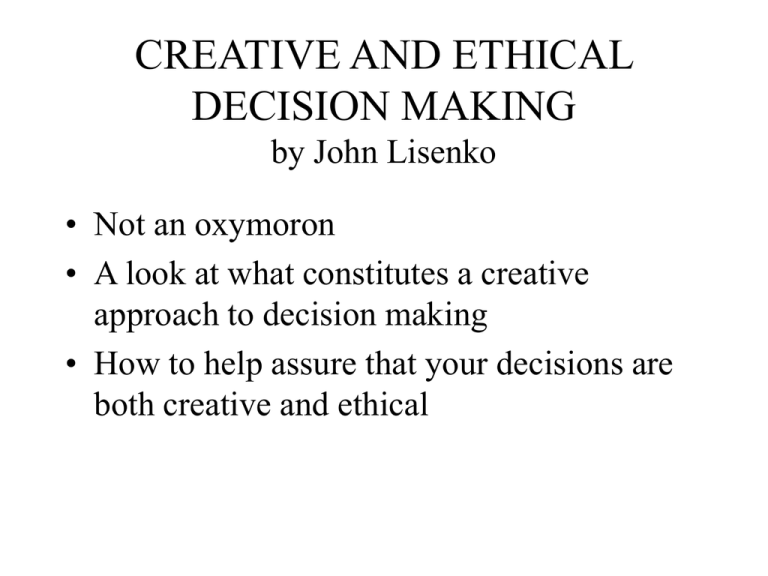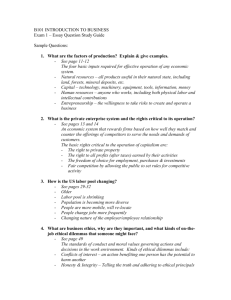CREATIVE AND ETHICAL DECISION MAKING
advertisement

CREATIVE AND ETHICAL DECISION MAKING by John Lisenko • Not an oxymoron • A look at what constitutes a creative approach to decision making • How to help assure that your decisions are both creative and ethical LEARNING OBJECTIVES • A review of methods that can be used to ensure continuous improvement in the way things are done • Distinguish ethical issues from other problems in decision making (legal, technical, etc) • Recognize and confront ethical “dilemmas” head on • Develop some guidelines for navigating through ethical murky waters. CREATIVE DECISION MAKING • The problem is you can’t get out of the box you’re in unless you think outside of it, or as Einstein put it “The significant problems we face today cannot be solved at the same level of thinking we were at when we created them.” Creative Decision Making • Clue: “We’ve always done it this way” means that it may be okay or, more likely it’s a process that’s a prime candidate for creative analysis • All decisions can be approached with an attitude of openness and creativity provided the motivation to excel is present. How do you avoid wasting time reinventing the wheel? Processes aimed at optimizing the decisionmaking process: • Benchmarking • Re-engineering • Networking • APWA self-assessment Benchmarking • Find out who is doing something really well and adapt it to your situation • Look at what worked well for you in the past and see if it can be applied to your current problem • APWA self assessment Re-engineering • Applicable when you have time and resources to institute a process change • Requires commitment at all levels and preferably an enthusiastic “champion.” Short Cut to Creative Decision Making Collaborative decision making, including: • Employee involvement • Using “sounding boards” – individuals whose opinion you trust CREATIVITY AND ETHICS • Thinking outside the box can get us into trouble if we also think outside the law or arrive at a creative solution that can be perceived as unethical. ETHICAL DILEMMAS IN PUBLIC WORKS DAILY LIFE • You probably resolve 95% of your ethical dilemmas unconsciously. • If you are conscious that you are on the horns of an ethical dilemma, then you are on track to behave ethically. • Whether you will or not depends to some extent on which of the ethical values takes priority. MORE DILEMMAS • Regulatory permits – do you ask for permission or ask for forgiveness? • “Environmental ethics” – what is a public works professional’s duty to society? STILL MORE • Traffic engineering and ethics – Speed limits and speed bumps – Road improvements, congestion and safety WHO ARE THE GOOD GUYS? • • • • • • Developers Contractors Environmentalists Engineers Maintenance Workers Planners




